Electricity Procurement Best Practices
Electricity Procurement Best Practices
Electricity Procurement Best Practices
Electricity procurement involves the process of acquiring and securing the supply of electricity to meet the energy needs of businesses, industries, or residential consumers. Here's why businesses need to integrate energy procurement best practices:
Why the Need for Energy Procurement Best Practices?
Energy procurement is a complex process that requires careful planning and execution to ensure reliable and cost-effective energy supply for your organization. Here are some best practices to follow:
Set Clear Objectives: Define your energy procurement goals and objectives. Identify whether your focus is on cost savings, risk management, sustainability, or a combination of factors. Clear objectives will help guide your decision-making process and align your procurement strategy with your organization's priorities.
Conduct Energy Assessments: Perform comprehensive energy assessments to understand your current energy usage patterns, identify areas of inefficiency, and determine potential energy-saving opportunities. This will provide valuable insights that can inform your procurement strategy and help prioritize energy efficiency measures.
Develop a Procurement Strategy: Create a well-defined procurement strategy that outlines the steps, timeline, and resources needed to achieve your energy procurement goals. Consider factors such as market conditions, budget constraints, contract durations, and renewable energy targets when formulating your strategy.
Stay Informed about Energy Markets: Keep a close eye on energy market trends, including price fluctuations, regulatory changes, and emerging technologies. Stay informed about local, regional, and global energy market dynamics to make well-informed decisions during the procurement process. Engage with industry experts or consultants if needed.
Request for Proposals (RFP): Develop a detailed RFP document to solicit bids from energy suppliers. Clearly outline your requirements, including energy volumes, contract duration, pricing structures, renewable energy options, and any specific criteria that are important to your organization. This will ensure consistent and comparable proposals from suppliers.
Evaluate Supplier Options: Evaluate potential energy suppliers based on their reliability, financial stability, track record, pricing competitiveness, customer service, and sustainability practices. Consider their experience in your industry and their ability to meet your specific energy requirements. Collect and verify references from existing clients to assess their performance and customer satisfaction.
Negotiate Favorable Contracts: Engage in active negotiations with shortlisted suppliers to secure the most favorable contract terms and conditions. Negotiate pricing, contract duration, renewable energy options, termination clauses, and any other relevant factors. Leverage market insights, competitive bids, and expert assistance to drive optimal outcomes.
Consider Risk Management Strategies: Develop risk management strategies to mitigate the impact of energy market volatility. This may include hedging strategies, fixed pricing agreements, or diversified energy sourcing. Consider the financial implications of different risk management approaches and strike a balance between risk mitigation and cost efficiency.
Monitor and Optimize Energy Performance: Implement energy monitoring systems to track and analyze your energy consumption in real-time. Regularly review your energy usage data, identify energy-saving opportunities, and implement energy efficiency measures. Continuously optimize your energy performance to achieve cost savings and sustainability targets.
Ongoing Contract Management: Establish a robust contract management process to ensure compliance with agreed-upon terms and conditions. Monitor energy invoices, track energy usage, and conduct periodic performance reviews with your energy suppliers. Stay proactive in resolving any contractual or operational issues that may arise.
Regularly Review and Adapt: Energy markets and your organization's energy needs can change over time. Regularly review your energy procurement strategy, contracts, and market conditions to ensure they remain aligned with your objectives. Be open to exploring new technologies, energy sources, and energy management practices that can further optimize your energy procurement process.
Electricity Procurement Best Practices
Electricity procurement involves the process of acquiring and securing the supply of electricity to meet the energy needs of businesses, industries, or residential consumers. Here's why businesses need to integrate energy procurement best practices:
Why the Need for Energy Procurement Best Practices?
Energy procurement is a complex process that requires careful planning and execution to ensure reliable and cost-effective energy supply for your organization. Here are some best practices to follow:
Set Clear Objectives: Define your energy procurement goals and objectives. Identify whether your focus is on cost savings, risk management, sustainability, or a combination of factors. Clear objectives will help guide your decision-making process and align your procurement strategy with your organization's priorities.
Conduct Energy Assessments: Perform comprehensive energy assessments to understand your current energy usage patterns, identify areas of inefficiency, and determine potential energy-saving opportunities. This will provide valuable insights that can inform your procurement strategy and help prioritize energy efficiency measures.
Develop a Procurement Strategy: Create a well-defined procurement strategy that outlines the steps, timeline, and resources needed to achieve your energy procurement goals. Consider factors such as market conditions, budget constraints, contract durations, and renewable energy targets when formulating your strategy.
Stay Informed about Energy Markets: Keep a close eye on energy market trends, including price fluctuations, regulatory changes, and emerging technologies. Stay informed about local, regional, and global energy market dynamics to make well-informed decisions during the procurement process. Engage with industry experts or consultants if needed.
Request for Proposals (RFP): Develop a detailed RFP document to solicit bids from energy suppliers. Clearly outline your requirements, including energy volumes, contract duration, pricing structures, renewable energy options, and any specific criteria that are important to your organization. This will ensure consistent and comparable proposals from suppliers.
Evaluate Supplier Options: Evaluate potential energy suppliers based on their reliability, financial stability, track record, pricing competitiveness, customer service, and sustainability practices. Consider their experience in your industry and their ability to meet your specific energy requirements. Collect and verify references from existing clients to assess their performance and customer satisfaction.
Negotiate Favorable Contracts: Engage in active negotiations with shortlisted suppliers to secure the most favorable contract terms and conditions. Negotiate pricing, contract duration, renewable energy options, termination clauses, and any other relevant factors. Leverage market insights, competitive bids, and expert assistance to drive optimal outcomes.
Consider Risk Management Strategies: Develop risk management strategies to mitigate the impact of energy market volatility. This may include hedging strategies, fixed pricing agreements, or diversified energy sourcing. Consider the financial implications of different risk management approaches and strike a balance between risk mitigation and cost efficiency.
Monitor and Optimize Energy Performance: Implement energy monitoring systems to track and analyze your energy consumption in real-time. Regularly review your energy usage data, identify energy-saving opportunities, and implement energy efficiency measures. Continuously optimize your energy performance to achieve cost savings and sustainability targets.
Ongoing Contract Management: Establish a robust contract management process to ensure compliance with agreed-upon terms and conditions. Monitor energy invoices, track energy usage, and conduct periodic performance reviews with your energy suppliers. Stay proactive in resolving any contractual or operational issues that may arise.
Regularly Review and Adapt: Energy markets and your organization's energy needs can change over time. Regularly review your energy procurement strategy, contracts, and market conditions to ensure they remain aligned with your objectives. Be open to exploring new technologies, energy sources, and energy management practices that can further optimize your energy procurement process.

